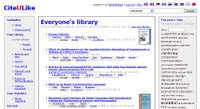The NY Times today had an article stating
"Washing After Sex May Raise H.I.V. Risk". It discusses the results of a large scale (N=2552) study in Uganda's Rakai district. According to the NYT and apparently a presentation (which I wasn't able to retrieve) at the International AIDS Society Conference in Sydney, which was held by one of the investigators - Dr. Frederick E. Makumbi, who is affiliated with local
Makerere University, but also
Johns Hopkins' Bloomberg School of Public Health - the data implies that there is either no or even an adverse effect of post-coital penal washing on HIV-Risk.
In short: the earlier you jump out of bed and run to the bathroom, the higher your risk of an HIV infection. No wonder the newspapers jumped at the story...
This not only contradicts intuition but also previous findings in infectious disease research, and you can go and read the whole NY Times article for speculations on possible causal explanations and (after-) sex tips by Johns Hopkins'
Dr. Ronald H. Gray.
Not having access to the study makes it a little difficult to challenge the findings on a sound basis, but I am nevertheless inclined to voice some doubts about the results. While assuming the setup and conduct of the study itself are proper, there are at least three points that immediately come to mind:
First of all it's not a clinical study, but a field study involving a survey. So there is obviously no randomization in terms of after sex washing behavior (funny idea btw. but somewhat unethical should there be really some connection between washing and HIV-infection-risk), which makes it a little difficult to establish causality.
Secondly, whereas the existence of an HIV infection can be measured
relatively accurate, the long-term-reported-after-sex-washing- behavior is a different story. Not only from the point of view of reported behavior in general! There might also be reason to think about social desirability in the subjects... In other words: Wouldn't you prefer to say you wash yourself a lot when the epidemiologists come?
And thirdly and in my eyes most obviously: the relation between washing behavior and the cicumstances of the sexual contact: I would bet that the usual immediate post coital washing behavior (if any) in a long term relationship differs massively from say the one after visiting a prostitute... Bearing these aspects in mind, the "don't wash" results might very well be not as valid as the data seems to suggest.












